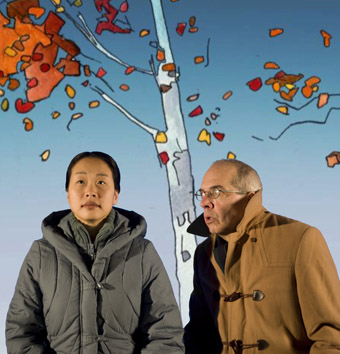 |
Sherry J Yoon, James Fagan Tait, My Dad, My Dog, Boca del Lupo |
Yoon appears as herself several times, emphasizing a (possibly false) truth-fiction distinction – “It’s not a real story, but every detail in it is true.” As the Korean cousin (all characters are unnamed), she presents a slide show about North Korean culture. A Canadian filmmaker (Billy Marchenski) worries that he’s been kidnapped; his monologues are rapid. Another Canadian, a professor (James Fagan Tait) who seems to have minimal knowledge of the birds he’s supposed to be studying, develops a flirtatious but awkward relationship with the Korean cousin by talking about his obssession with pigeons. Cuts from the original Godzilla backdrop the filmmaker’s thoughts about monster movies. Sound is mostly live: performers stand stage right by a microphone to provide voiceovers for hand-drawn animated scenes; Alicia Hansen plays gentle rills on an upright piano, stage right, silent movie style.
The play is a comedy, ranging from dreamy scenes of feeding (animated) pigeons to insightful comments on Kim Jong Il’s obssession with cinema to hilarious moments of non-communication sparked by differences in Canadian and Korean expectations. But it doesn’t find its focus in the story. The filmmaker overcomes the fear that he may be kidnapped and learns that he may be too presumptuous, but what does it mean to learn something so general about oneself? The pigeon-man remains a flat character whose role is to urge the Korean cousin to talk about herself. She becomes somewhat personal with him, but gives no specifics about who her father was, or why it would matter for her dad to appear as a dog. If that conversational distance is meant to reflect on opaque North Korean privacy habits, then the significance of the dad-dog needs to appear in another way. And the dad-dog, one of Jay White’s gentle, hand-drawn animations, doesn’t get enough stage time to become anything more than entertaining (there’s a great scene where the dad-dog confesses to another animated dog that he thinks the Korean woman has bad plans for him, but he can’t really tell because she keeps speaking English).
Because the storytelling style skips all over the place – the flow between scenes is almost, but not quite tight – the set and the layers of technical innovation take over and become the heart of the performance. In a high-tech culture increasingly devoted to all things digital, it is a pleasure to enter the well-crafted world of low-tech projections that White uses to create the whimsical set for My Dad, My Dog. White’s hand-drawn animations fill a movie-size screen, so images are large enough for the performers to walk around in or, suprisingly, for White to animate around the performers. In one scene, for example, White pans down an image of a tall elevator while a performer stands still. Elsewhere, the projection is set up so he can draw a backdrop live: as he sketches on a glass panel, the lines gradually form a restaurant and fellow patrons around the two performers sitting centre stage at a three-dimensional dining table.
The simple animation techniques are deft and playful, innovative in how they surround the performers. My Dad, My Dog is fun but ultimately remains sketchy, leaving the audience charmed by literal drawings instead of metaphorical ones.
Boca del Lupo, My Dad, My Dog, created by Sherry J Yoon, Jay White, director Jay Dodge, performers Billy Marchenski, James Fagan Tait, Sherry J Yoon, animation and scenography Jay White, music Alicia Hansen, costumes Reva Quem, lighting Jeff Harrison, Jay Dodge; Roundhouse Community Arts and Recreation Centre, Vancouver, Jan 25-26, Jane 29-Feb 2; PuSh International Festival of Performing Arts, Jan 16 - Feb 3
Meg Walker is a nomadic fiction and non-fiction writer currently based in Vancouver, where she also spends plenty of time making visual art.
© Meg Walker; for permission to reproduce apply to [email protected]








 back
back